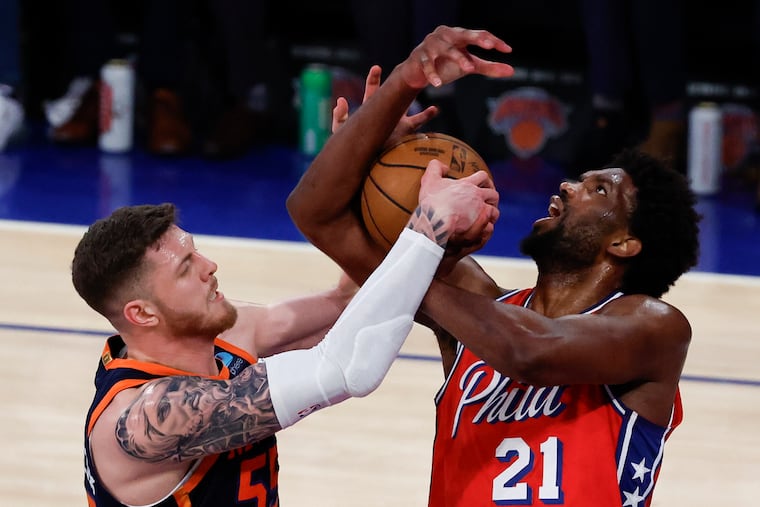The Sixers are allowing the Knicks to push them around. Time for them to get tougher and smarter.
Through its tenacious play, New York is forcing referees to make a choice: Do we call a bunch of fouls or let them play? They're letting them play and the Sixers had better adjust to this reality.

For 48 hours, the public discussion around the 76ers revolved around those final crushing and chaotic seconds of Game 2, around the timeout that neither Nick Nurse nor Kyle Lowry called, around the fouls that the Knicks allegedly committed and the referees didn’t call, around a 104-101 loss that should have been a victory. The culmination of all that chatter was the NBA’s admission Tuesday that, well, yes, Maxey was fouled a time or two, and Nurse did signal that he wanted a timeout, and well, we and our esteemed officials will try to do better next time. What vindication for the Sixers. Good job filing that grievance, guys. Guess what? You’re still four whines away from the second round.
Oops. Sorry. Wins. Four wins away.
There’s a serious point to be made here, though, and in focusing so much on whether Jalen Brunson did, in fact, attempt to give Maxey an atomic wedgie on that late inbounds play, you can miss it. Game 2 is gone. Game 2 is over. As Nurse said Wednesday after the Sixers practiced at their Camden headquarters, “Clock hit midnight on that game, and I moved on.” What matters for the Sixers, now that they’re down two games to none, now that they’re staring at a gotta-have-it Game 3 at the Wells Fargo Center on Thursday night, is whether they understand what the Knicks are doing and what it will take to beat them.
» READ MORE: The Sixers-Knicks maddening ending to Game 2 is exactly what playoff basketball should be
That crazy closing sequence at Madison Square Garden — Maxey’s turnover, Donte DiVincenzo’s missed three-pointer, Isaiah Hartenstein’s offensive rebound over Joel Embiid, DiVincenzo’s made three-pointer — showed the toughness and brilliance of the Knicks’ entire approach. And all the subsequent complaints from the Sixers and their fans about the officiating only obscures the real reason that New York pulled out Game 2 and is halfway to winning this series.
The Knicks didn’t sit back and wait for the Sixers to screw up. They took the game from them. They ripped the ball out of Maxey’s hands — for the second time in the fourth quarter, actually — and dared the referees to call a foul, and the referees didn’t. The strategy was basically the same one that the Seattle Seahawks’ secondary, Richard Sherman and Earl Thomas and the rest of the “Legion of Boom,” used back in 2013 and ‘14. Bump. Grab. Jostle. Do it all the time. Yeah, the officials may throw a couple of pass-interference flags, but they can’t penalize you on every play, can they? No, they can’t and won’t. They’ll let most of it go. So play with an edge, and you’ll gain an edge on your opponent.
Brunson and Josh Hart and the Knicks took a calculated risk by tearing at Maxey, and it worked, and they had to know it might work, because the NBA has been trending in that direction — in calling fewer fouls — for a while. Since midseason, in fact. Don’t the Sixers have to adjust to that new reality, especially in the playoffs?
“You certainly probably have some factual, statistical data to back up your question, right?” Nurse said. “You’re not just going on hearsay. You probably understand that free throws have gone way down, all the stuff that I know you know that we don’t have to repeat.”
It’s worth repeating anyway: The writer and statistician Tom Haberstroh has noted that, since the All-Star break in February, the number of free-throw attempts per game has been plummeting, and so has the number of total points per game. The referees aren’t putting their whistles to their lips as frequently as they did months ago, the theory being that it had become too easy for players to put the ball in the basket, that the crackdown on hand-checking in recent years had led to higher scores but duller games, and that the NBA may or may not have instructed its officials to Let ‘em play a little more.
The Knicks were the ideal team to take advantage of this shift. Tom Thibodeau has always demanded a bare-knuckle brand of basketball from his teams, and has plenty of players on this roster who are happy to oblige their coach. It might seem ironic that the Sixers had more fouls called against them through Games 1 and 2 (42) than the Knicks did (35), but it’s not. New York’s collective identity is built around its tenacity, and that truth means that, when there’s a tussle for a loose ball or a play that could go either way — Was it a steal or a reach-in? Was it a clean block or a foul? — the Knicks are likely to get the benefit of the doubt, based on their rep and on human nature.
“The only thing I would ever say is I’m trying to, in any game, hope that they’re calling the same thing so you get a gauge on what’s being called,” Nurse said. “If bumps on Brunson are being called, I want bumps on Joel called. If bumps on Brunson are being called, I want the bumps on Tyrese called. I think we understand it’s physical and it’s the playoffs.”
Good. Prove it.